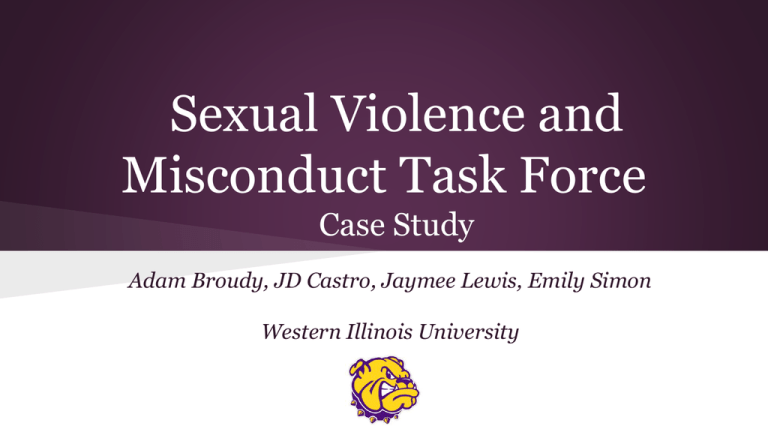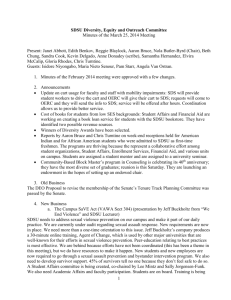
Sexual Violence and
Misconduct Task Force
Case Study
Adam Broudy, JD Castro, Jaymee Lewis, Emily Simon
Western Illinois University
President Obama’s Task Force
Weekly Address: President Obama: Taking Action to End Sexual Assault
•
•
•
Origins: Sexual violence in military
Panel: Senior administrators
Focus:
o
Protecting women and educating men
o
Creating a plan to implement on college campus
o
Educate on sexual violence
WIU Statistics
●
Men and boys are often survivors of sexual assault. According to national
statistics, about 8% of all victims are male.
●
According to the American College Health Association’s 2008 National College
Health Assessment approximately…
○
1,447 students at WIU had experienced sexually aggressive behavior or
attempted/completed sexual assault.
○
900 students had experienced stalking.
○
1,802 students had likely experienced emotional, physical and/or sexual
abuse within a relationship.
WIU Statistics
● According to Dr. Melanie Hetzel-Riggin’s research, which she
conducted on the WIU-Macomb campus from 2006-2009, found
that of the 1,276 women surveyed…
○ 19.4 percent reported a history of domestic or dating violence.
○ 13.3 percent reported a history of sexual aggression or assault.
○ 32.1 percent reported being stalked.
Context of
Western Illinois University (WIU)
—
•
•
•
•
WIU received a $3000.00 Interpersonal Violence Prevention Initiative
(IVPI) grant from U.S. Department of Justice's Office on Violence Against
Women, (OVW) in 2010-2013. Did not renew.
—his grant benefitted the university’s ability to respond and increase
T
awareness around sexual violence and sexual misconduct.
—oughly 25 departments were involved in this initiative ranging within
R
Student Services, Academic Affairs, & Administrative Services.
Served individuals who were affected by sexual assault, domestic violence,
dating violence, and stalking
What the grant was able to do?
•
•
•
•
•
•
Online and in person training for campus police officers and judicial
board members on laws, policies, and protocols.
Required first year experience course for incoming students.
Peer-led, bystander intervention program.
Programming for interpersonal violence prevention and
underrepresented groups.
Comprehensive website and marketing campaign.
Interpersonal Violence Response Team.
Reporting Resources
•
•
•
Title IX Coordinator
o Investigates all matters and allegations involving sexual violence, dating
and domestic violence, stalking, and retaliation.
Office of Public Safety
—
o Investigates criminal charges pursued by victims of interpersonal violence
for crimes committed on campus.
Macomb Police Department
—
o Investigates criminal charges pursued by victims of interpersonal violence
for crimes committed off campus within the city of Macomb.
Reporting Resources
•
•
•
McDonough County State’s Attorney
—
o Provides victims with information and guidance regarding the criminal
justice system and legal procedures
Student Judicial Programs
o Provides assistance and processes cases through the student conduct
system
Student Legal Service
—
o Professional legal office available to all students free of charge to assist
students with answers to their legal questions
o Directs students to sources of help
o Gives advice in various types of situations except in the case of a felony.
Campus and Community Resources
o Center for the Study of Masculinities and Men’s Development
o Interpersonal Violence Prevention Initiative
o 24 hour Sexual Assault Crisis Line
o Beu Health Center Educational Programs
o Domestic Violence/Sexual Assault programs
o Counseling Center
o WIU Psychology Clinic
o Women’s Center
Benchmarking
Western Illinois University (Prior to Task Force)
●
Sexual Assault Counselors
●
Reporting Protocols and Procedures
●
Community Victim Resources
●
Campus Policies
●
Safety Systems (Escorts, Blue Lights, etc.)
●
Bystander Intervention Training
●
Center for Men and Masculinities Initiatives
●
Interpersonal Violence Prevention Initiatives (IVPI)
●
Terms and Definitions
●
Resource Packets in Residence Halls
●
Focus on Consent
●
Sexual Violence and Misconduct Programming
●
Myths and Facts
●
Sexual Assault Crisis Line
Southern Illinois, Northern Illinois, and Eastern Illinois
•
•
•
•
•
•
•
•
•
•
•
•
•
Sexual Assault Counselor(s) (SIU, NIU, & EIU)
Rape and Emergency Crisis Numbers on Web (SIU)
Community Resources on Web (SIU, NIU, & EIU)
Reporting and Protocols (SIU, NIU, & EIU)
Male Survivors Section (EIU)
Safety Improvements on Campus (SIU & EIU)
Rights of Survivors (NIU)
Campus Policies (SIU, NIU, & EIU)
Prevention and Advocacy (SIU & EIU)
Bystander Intervention Training (SIU & EIU)
Myths and Facts (SIU, NIU, & EIU)
LGBTQ Sexual Assault Information (EIU)
“What you need to know” section (SIU)
Task Force Purpose and Mission
Purpose: In response to President Obama’s task force, the Western Illinois University Sexual
Violence and Misconduct task force was created to serve as a multi-disciplinary team of faculty,
staff, and students with the sole purpose of supporting the needs of men and women on our
campus who are involved in acts of sexual violence. We are tasked with creating effective
programs and procedures that support both the alleged victim and perpetrator through
investigations and the campus community’s changing culture.
Mission: The Western Illinois University Sexual Violence and Misconduct Task Force aims to
—
educate the community on current issues and facts surrounding sexual violence and
misconduct. We strive to empower community members to report issues of sexual misconduct
and enter into a meaningful dialogue that will transform the current campus culture
surrounding sexual violence and consensual relationships.
Who is on the Task Force?
●
Students
●
Counseling Center
●
Equal Opportunity & Access Office (Title IX Coordinator)
●
Student Development Office
●
Emergency Consultation Team (ECT)
●
Office of the Mayor - Macomb
●
President of the University
●
Office of Public Safety
●
Faculty - Women’s Studies
●
Women’s Center
●
Center for the Study of Masculinities and Men’s Development
●
Student Legal Services
Overview of Task Force
•
•
•
•
•
•
Accommodating the needs of survivors of sexual violence
Ensuring rights are protected—
—
Encouraging sexual misconduct prevention
Reconstructing campus culture climate
Educating the campus community
Changing myths of sexual assault
Defining Terms
Sexual violence and misconduct is any sexual act that is perpetrated
without receiving consent.
Consent is a voluntary, positive agreement between the participants to
engage in specific sexual activities.
Survivor is anyone who has been an alleged “victim” of an act of sexual
violence.
Influence of Law and Policy
●
The university’s responsibility
○
to protect students in the academic, extracurricular, educational and athletic programs of
schools
○
to initiate a prompt, thorough, and impartial investigation when the institution knows or
should reasonably have known of an occurrence.
○
to disseminate a notice of non-discrimination
○
to designate a Title IV coordinator
○
to promote discussion on rights of all parties involved through hearing practices, due
process, and FERPA laws.
○
to discourage bullying in the form of taunting or other forms of harassment.
Functions of Task Force
•
•
•
•
•
•
•
•
•
Myths to Facts Campaign (Solicit help from campus departments and community organizations
to distribute materials)
Bystander Intervention Training
Publicizing rights of survivors and respondents
Examine language used in official campus communications
Updating and publicizing campus policies (reporting tools, advertising resources, trainings, etc.)
—
Post-Assault Counseling training
—
#iCONSENT Campaign (Widely share what consent is and how it is given)
Resources for survivors
Utilizing social media networks to expand knowledge and resources
Campus Culture Climate
•
Theory
—
o Astin’s Input-Environment-Output Model
•
•
o Baxter Magolda -Learning Partnership Model
Changing the campus culture
—hanging the paradigm from victims having to support themselves
C
to the university taking a more supportive and proactive role
Social Media and Task Force
•
•
Self care app
—
o
Online help with someone on a private chat 24/7
o
Talk with other survivors in a chat room
—
o
Resources on sexual survival
o
Create a plan on what is your best option for you
Twitter - #iCONSENT
Online Help
24/7
Chat room
with
Survivors
Resources
Create a
plan
Timeline for Implementation
•
•
•
•
•
•
•
•
•
Myths to Facts Campaign (within first six months)
Bystander Intervention Training (already established)
Publicizing rights of survivors and respondents (within first month)
Examine language used in official campus communications (within first 3 months)
Updating and publicizing campus policies (within first two months)
—
Post-Assault Counseling training (already established)
—
#iCONSENT Campaign (within first year)
—
Resources for survivors (already established)
Utilizing social media networks to expand knowledge and resources (within first 3
months)
Assessment
●
Formative:
○
●
Feedback forms and program evaluations.
■
Bystander Intervention training
■
Post-Assault Counseling training
Summative:
○
Overall sexual violence campus climate inventory and comparison of campus
statistics in a pre-test and post-test feedback survey.
■
Perceptions of myths and facts surrounding sexual violence
■
Rights and responsibilities of parties involved
■
Connection between language and student feelings of campus climate
■
Availability of resources
■
Utilization of social media.
Implications
•
•
•
•
•
•
Initial push back or lack of “buy-in” from campus constituents because of
changes in policy and initiatives.
Funding is limited so not all initiatives may be able to be implemented (or
to the extent desired).
Require deeper collaboration throughout campus departments.
Initiatives may put the University in a “bad” light conveying that sexual
assaults are prevalent on campus.
Community members will become more aware of what sexual violence and
misconduct are and how they can help to prevent it.
Change campus culture from victims supporting self to a culture of “don’t
rape”.
References
•
•
•
•
•
•
•
Baxter Magolda, M. B. (2004). Learning partnership model: A framework for promoting self-authorship. In M.
B.Baxter Magolda & P. M. King (Eds.), Learning Partnerships: Theory and models of practice to educate
for self-authorship (pp. 37-62). Sterling, VA: Stylus publishing.
Calmes, J. (2014) Obama Seeks to Raise Awareness of Rape on Campus. Retrieved from
www.nytimes.com/2014/01/23/us/politics/obama-to-create-task-force-on-campus-sexualassaults.html?_r=0
Clery Center for On Campus Security. (2012). Campus Sexual Violence Elimination Act. Retrieved from
http://clerycenter.org/campus-sexual-violence-elimination-save-act
January 25, 2014 http://www.youtube.com/watch?v=_5uQRRmvUcw
Office of Civil Rights. (2011). Dear Colleague Letter. Retrieved from
http://www.whitehouse.gov/sites/default/files/dear_colleague_sexual_violence.pdf.
Renn, K. A. & Reason, R. D. (2013). College students in the United States: Characteristics, experiences, and
outcomes. San Francisco: Jossey-Bass.
White House. (2010). Fact Sheet: The Violence Against Women Act. Retrieved from
http://www.whitehouse.gov/sites/default/files/docs/vawa_factsheet.pdf
Your life has
PURPOSE.
Your story is
IMPORTANT.
Your dreams
COUNT.
Your voice
MATTERS.
You were born to
make an IMPACT!
#iCONSENT






